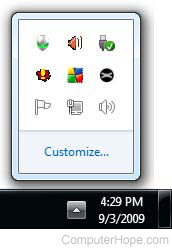Antivirus program

Also known as a AVS (antivirus software) and AV (antivirus), an antivirus program is a software utility designed to protect your computer or network against computer viruses. If a virus is detected, the computer displays a warning asking if the infection should be quarantined, removed, ignored, or moved to the vault.
Do I need an antivirus program?
If your computer is infected with a virus without an antivirus program installed, any malicious actions could occur. If you are running Microsoft Windows or macOS, we recommend installing an antivirus computer program. If you have the latest version of Windows, make sure, at the very least, that Windows Defender is running.
What happens if a virus infects a computer without an antivirus?
If a virus infects a computer without an antivirus program, it may delete files, prevent access to files, send spam, spy on you, or perform other malicious actions. In some situations, a computer may not be compatible with your computer, and the virus would only be used to spread to other computers.
What are examples of antivirus programs?
Today, different companies and antivirus products are available for computers, servers, and smartphones. New versions of Microsoft Windows even include Windows Defender, which with the latest versions of Windows, can defend against computer viruses. Other well-known antivirus programs include Norton antivirus and McAfee, and popular free antivirus programs include Avast and AVG. See the link below for a full list of links and comparisons.
Antivirus programs also run from a USB (universal serial bus) flash drive or CD/DVD, making them portable and available to run without being installed. Many portable antivirus programs provide a GUI (graphical user interface) to run antivirus scans, while others provide a command line interface to run scans from the command line. Additionally, some portable antivirus programs are bootable, meaning they can scan a computer at boot up. A bootable antivirus program is beneficial if a computer will not load into an operating system due to virus infection or other problems.
Portable antivirus programs
Below are several portable antivirus programs that have proven to be excellent at removing viruses and malware.
- ClamWin Portable - provides a GUI to run scans and remove viruses and spyware that are found.
- Comodo Rescue Disk - a bootable antivirus program that provides a user-friendly GUI for running scans and removing threats; able to run on a USB flash drive or a CD/DVD.
- Emsisoft Emergency Kit - provides a command line interface and a GUI, allowing you to choose which way to run scans and remove malware.
- Spybot - Search & Destroy Portable - the portable version of the popular Spybot malware removal tool; provides a GUI to run scans and remove threats found on a computer.
After installing an antivirus, what should I do?
Once an antivirus is installed and running, the program protects your computer from any new viruses or malware installed on your computer. All new antivirus programs also schedule times to scan all computer files for past infections or can be manually run at any time.
How do I open my antivirus program?

After installing an antivirus program on your computer, it should automatically start each time you boot your computer. If the antivirus program is not running in the memory (in the background), your computer is not entirely protected. When running, the program should show in the Windows Notification Area. In the picture, the AVG is the center icon in the Windows Notification Area. Right-clicking or double-clicking the antivirus icon opens the program and lets you manually start a scan or view other available options.
When was the first antivirus program written?
The first antivirus programs began appearing in 1987 with the introduction of an antivirus program from G Data Software for the Atari ST. Later in the same year, VirusScan was introduced by John McAfee, which became the McAfee antivirus program.
How to update antivirus definitions or keep the antivirus updated
Every antivirus program also has definitions that tell the program how to detect and clean any new viruses that may have been released. Today, most antivirus programs automatically connect to the Internet and download the latest definitions or warn you if it's not up-to-date.
If you do not update your antivirus, it cannot detect any new viruses.
What happens if we do not update an antivirus?
An antivirus update keeps your software up-to-date with all the latest virus definitions. If a new virus is released and you have not updated your antivirus, it cannot detect the virus and can infect your computer.
Can you get a virus with an antivirus installed?
Yes, although an antivirus is installed on a computer, it's still possible to become infected. However, having an antivirus still helps protect it from known viruses.
Anti-spyware, Fake antivirus, Security terms, Software, Software terms, Virus
